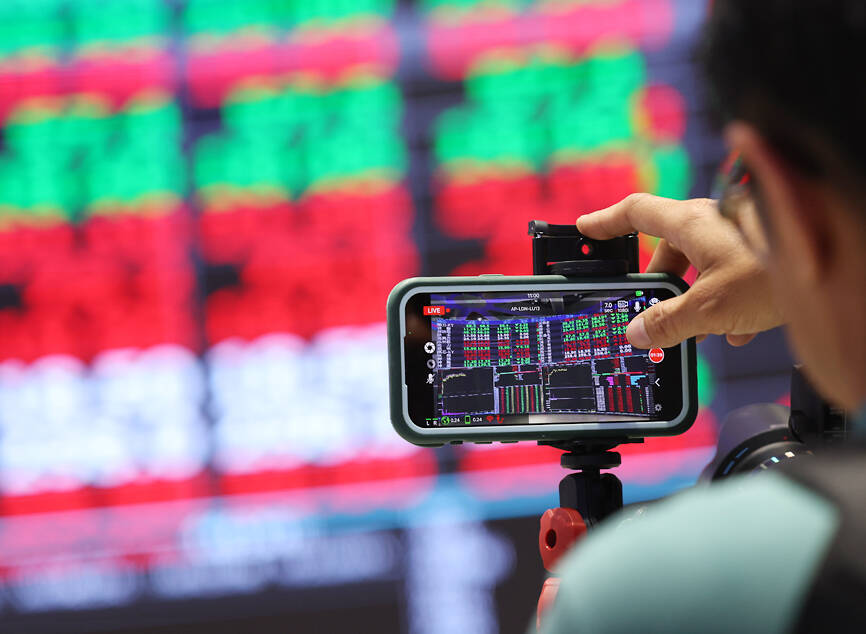MSCI Inc, a global index provider, has trimmed Taiwan’s weighting in two major indices, while leaving another unchanged in its latest quarterly review.
In a statement on Friday, MSCI said it cut Taiwan’s share in the closely watched MSCI Emerging Markets Index to 19.40 percent from 19.45 percent, and in the MSCI All-Country Asia ex-Japan Index to 21.89 percent from 21.97 percent.
The review, conducted each February, May, August and November, guides global investors in portfolio allocation. All changes, calculated in US dollars, would take effect after markets close on Aug. 26, MSCI said.

Photo: CNA
Among emerging markets, India saw the largest reduction in the Emerging Markets Index, down 0.07 percent, while China recorded the biggest gain, up 0.15 points. Changes for other markets were minimal.
MSCI said it would add aesthetics medicine and inflammatory disease drug developer Caliway Biopharmaceuticals Co (康霈生技) and server rail maker King Slide Works Co (川湖科技) to its Global Standard Indexes, while removing footwear supplier Pou Chen Corp (寶成工業) and property developer Ruentex Development Co (潤泰創新).
Market analysts said the changes reflected fluctuations in the affected stocks’ share prices.
In its Global Small Cap Index, MSCI would remove Caliway and King Slide, while adding Pou Chen and Ruentex.
It would also add pneumatic and thermal process solution provider AblePrint Technology Co (印能科技), printed circuit board maker First Hi-tec Enterprise Co (高技企業), Fulltech Fiber Glass Corp (富喬工業), water recycling services provider Mega Union Technology Inc (兆聯實業) and zipper maker Wiselink Co (智通科創) into the Global Small Cap Index.
In addition to Caliway and King Slide, MSCI said it would drop Chung Hwa Pulp Corp (中華紙漿) and Huang Hsiang Construction Corp (皇翔建設) from the Global Small Cap Index.
Following the review, the MSCI Taiwan Index remained at 87 constituents. King Slide saw the largest weighting increase, up 0.25 percentage points to 0.25 percent, while Pou Chen recorded the biggest drop, down 0.12 points to zero, MSCI said.

GROWING OWINGS: While Luxembourg and China swapped the top three spots, the US continued to be the largest exposure for Taiwan for the 41st consecutive quarter The US remained the largest debtor nation to Taiwan’s banking sector for the 41st consecutive quarter at the end of September, after local banks’ exposure to the US market rose more than 2 percent from three months earlier, the central bank said. Exposure to the US increased to US$198.896 billion, up US$4.026 billion, or 2.07 percent, from US$194.87 billion in the previous quarter, data released by the central bank showed on Friday. Of the increase, about US$1.4 billion came from banks’ investments in securitized products and interbank loans in the US, while another US$2.6 billion stemmed from trust assets, including mutual funds,

Micron Memory Taiwan Co (台灣美光), a subsidiary of US memorychip maker Micron Technology Inc, has been granted a NT$4.7 billion (US$149.5 million) subsidy under the Ministry of Economic Affairs A+ Corporate Innovation and R&D Enhancement program, the ministry said yesterday. The US memorychip maker’s program aims to back the development of high-performance and high-bandwidth memory chips with a total budget of NT$11.75 billion, the ministry said. Aside from the government funding, Micron is to inject the remaining investment of NT$7.06 billion as the company applied to participate the government’s Global Innovation Partnership Program to deepen technology cooperation, a ministry official told the

Taiwan Semiconductor Manufacturing Co (TSMC, 台積電), the world’s leading advanced chipmaker, officially began volume production of its 2-nanometer chips in the fourth quarter of this year, according to a recent update on the company’s Web site. The low-key announcement confirms that TSMC, the go-to chipmaker for artificial intelligence (AI) hardware providers Nvidia Corp and iPhone maker Apple Inc, met its original roadmap for the next-generation technology. Production is currently centered at Fab 22 in Kaohsiung, utilizing the company’s first-generation nanosheet transistor technology. The new architecture achieves “full-node strides in performance and power consumption,” TSMC said. The company described the 2nm process as

Even as the US is embarked on a bitter rivalry with China over the deployment of artificial intelligence (AI), Chinese technology is quietly making inroads into the US market. Despite considerable geopolitical tensions, Chinese open-source AI models are winning over a growing number of programmers and companies in the US. These are different from the closed generative AI models that have become household names — ChatGPT-maker OpenAI or Google’s Gemini — whose inner workings are fiercely protected. In contrast, “open” models offered by many Chinese rivals, from Alibaba (阿里巴巴) to DeepSeek (深度求索), allow programmers to customize parts of the software to suit their